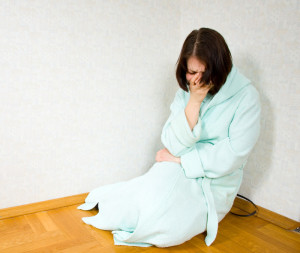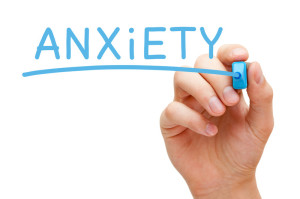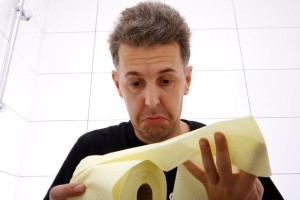IBS Depression and Anxiety
What a miserable trio!

© Can Stock Photo
Many people with IBS find that they also have bouts of anxiety and/or depression. If this sounds like you, please know that you are not alone.
Scientific studies have shown that people with IBS are very likely to also have problems with anxiety and/or depression.
IBS and Depression… Is there a link?
Depression is believed to be caused by problems with neurotransmitters, particularly one called Serotonin. As I explained in the IBS Brain Gut Connection page, there is more serotonin in your bowels than in the rest of your nervous system!
Could it be that the problems with your bowels are related to a problem with serotonin production?
Could the same problem be causing serotonin problems in your brain?
I haven’t been able to find good science yet to back it up (though it may exist). For my part, I think that somehow, this is part of the IBS puzzle.
What are the symptoms of depression?
According to the National Institute of Mental Health, signs and symptoms include:
- Persistent sad, anxious, or “empty” feelings
- Feelings of hopelessness or pessimism
- Feelings of guilt, worthlessness, or helplessness
- Irritability, restlessness
- Loss of interest in activities or hobbies once pleasurable, including sex
- Fatigue and decreased energy
- Difficulty concentrating, remembering details, and making decisions
- Insomnia, early-morning wakefulness, or excessive sleeping
- Overeating, or appetite loss
- Thoughts of suicide, suicide attempts
- Aches or pains, headaches, cramps, or digestive problems that do not ease even with treatment.
Notice that last line! Digestive problems that do not ease, even with treatment!
On a related note, People with serotonin problems often have problems with panic attacks and anxiety.
IBS and anxiety… Partners in crime!

© Can Stock Photo
Just about everyone with IBS knows that stress and IBS are linked.
Feeling nervous or stressed can bring on an IBS attack pretty quickly for most irritable bowel syndrome suffers.
The brain and bowel are connected, problems with one can lead to problems in the other in my opinion. I know that when my bowels are acting up, I feel miserable and depressed and sometimes anxious.
What’s more, I can cause depression and anxiety just by eating foods I know I should avoid! Yep, ol’ Shawn sometimes has a weak will and eats something he shouldn’t.
The next day I’m a miserable wretch both in my head and in my gut. So is the brain gut connection a two way street? I think so.
IBS, depression and anxiety… Prozac to the rescue?
Did you know that Prozac, that famous depression medicine, was originally developed to treat problems with the digestive tract? It’s true. But what happened was, the researchers found that the mood of test subjects improved.
Anti-depressants (including but not limited to Prozac) are often used to treat depression and anxiety, but did you know that anti-depressants have been used to treat IBS for over 30 years?
And the amazing part is that it HELPS most people with IBS!
If you want to wade through the jargon, there is a National Institute of Health study saying exactly that.
The mystery to me is why more people aren’t treated with antidepressants since it seems that treatment is effective.
Depression and IBS…Are these numbers coincidence?

© Can Stock Photo
IBS affects 20 percent of the population, and affects twice as many women as men.
Depression affects 20 percent of the population, and affects twice as many women as men.
It seems to me that someone should be investigating this puzzle piece.
Should you take medicine for depression if you have IBS?
That’s up to you and your doctor of course.
Many people don’t like trying anti-depressants because they feel like it’s a sign that they are weak or mentally ill.
I don’t think you should suffer because of that.
I think once you’ve ruled out other causes such as food sensitivities, etc., you should try whatever is proven to work.
Good luck out there!
Shawn
Find out more about the IBS brain gut connection.
Find out more about foods to avoid with IBS.
Read about how to find a doctor for IBS.
3 Replies to “IBS Depression and Anxiety”
Hello Shawn
I have been suffering from depression and IBS w/ constipation for a very long time. My physician is treating my depression with antidepressants however I haven’t seen any changes with my constipation. The chronic fatigue is literally exhausting and the frustration of being tired all the time paired with depression and occasional bouts with anxiety feels like a viscous cycle. I recently had all of my levels tested and they were fine with the exception of my vitamin D. I eat tons of fruit and vegetables daily I also drink nothing but water and lemon water. My physician prescribed Linzess for my constipation, however I would prefer to find a more natural solution. I concur with you on your views of bowel and brain. On the rare occasions my bowels have given me some relief, mentally I felt better and happier. Any suggestions or help you can provide would be greatly appreciated.
Hi Shawn,
I am from Nepal and have had IBS symptoms for the last 13 years. Did all sorts of tests and took many meds. Recently i had panic attacks and my doc prescribed Paxil. This has helped a good deal with my IBS but i still feel very weak and fatigued. Kindly suggest how can i increase my energy levels.
MNy thx
Pankaj
Hello Pankaj, Sorry to hear you’re so sick. 13 years is a LONG time! Sometimes weakness and fatigue can be associated with depression, which can be associated with panic attacks. Other ideas are that you may have very low vitamins and minerals due to such a long term problem. If there is someone in your area that can help with advice on foods and vitamins (like a nutritionist or better yet a dietician) I’d make that appointment and fast!
Another issue you may be up against is a parasite. I think your doctor should test for parasites. I don’t know much about Nepal, but I’ve heard there are sometimes problems with clean water there, so a parasite or bacteria could be your issue. I hope it helps, Shawn